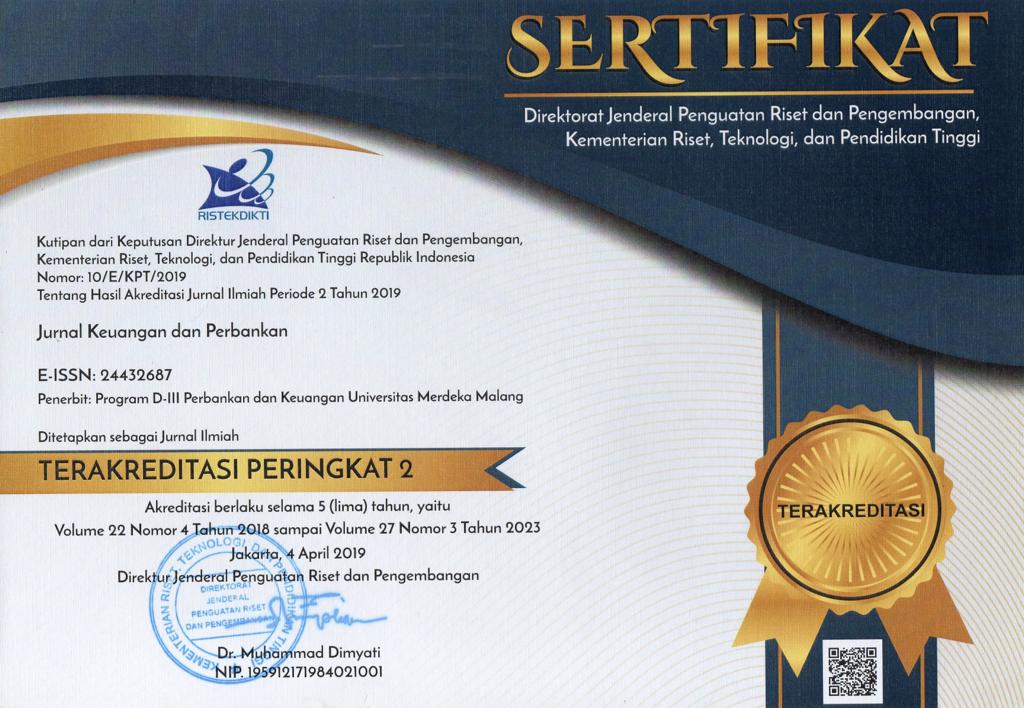KETERKAITAN KEBIJAKAN PEMISAHAN TERHADAP TINGKAT EFISIENSI PADA INDUSTRI PERBANKAN SYARIAH DI INDONESIA
Abstract
purpose of this study was to analyze the relationship between separation policy that had been implemented
since 2008 with the operational efficiency of the Islamic banking industry in Indonesia. The method used was
regression with dummy variables. The variables used in this study were a dummy variable separation,
deposits, financing, assets, NPF, margin deposits of one month, and ROA. The result showed that separation
policy had a relationship with the operational efficiency on Islamic banking industry in Indonesia. This result
implied that separation policy should have been evaluated because it caused the industry to be less efficient
when compared with the condition before the separation.
Keywords
Full Text:
pdfReferences
Al Arif, M.N.R. 2015. The Effect of Spin-off Policy on Financing Growth in Indonesian Islamic Banking Industry. Journal Al-Ulum, 15(1): 173-184.
Chu, P-Y, Teng, M-J., Lee, C-T, & Ciu, H. 2010. Spin-ff Strategies and Performance: A Case Study of Taiwan’s Acer Group. Asian Business & Management, 9(1): 101-125.
Elfring, T. & Foss, N.J. 1997. Corporate Renewal Through Internal Venturing and Spin-offs: Perspectives from Organizational Economics. Working Paper 97-7. Department of Industrial Economics and Strategy Copenhagen Business School.
Endri. 2011. Evaluasi Efisiensi Teknis Perbankan di Indonesia: Aplikasi Two-Stage Data Envelopment Analysis. Paper pada Forum Riset Perbankan Syariah IV. DPP Ikatan Ahli Ekonomi Islam Indonesia (IAEI) dan Bank Indonesia.
Hamid, A. 2015. The Impact of Spin-off Policy To The Profitability on Indonesian Islamic Banking Industry. Journal Al-Iqtishad, VII(1): 131-140.
Kiswono, B. 2012. Spin-off Unit Usaha Syariah (UUS), Kendala dan Strategi Penyelesaiannya. Makalah. (Tidak Dipublikasikan). Jakarta: Bank Indonesia.
Nasuha, A. 2012. Dampak Kebijakan Spin-off Terhadap Kinerja Bank Syariah. Jurnal Iqtishad, IV(2): 241-258.
Novarini. 2009. Efisiensi Unit Usaha Syariah dengan Metode Stochastic Frontier Analysis (SFA) Derivasi Fungsi Profit dan BOPO. Tesis. Program Studi Timur Tengah dan Islam Universitas Indonesia.
Pramuka, B.A. 2011. Assesing Profit Efficiency of Islamic Banks in Indonesia: An Intermediation Approach. Journal of Economics, Business and Accountancy Ventura, 14(1): 79-88.
Rizqullah. 2013. Pemilihan Metode Spin-Off Unit Usaha Syariah Bank Umum Konvensional Menjadi Bank Umum Syariah di Indonesia. Disertasi. Program Doktor Ilmu Ekonomi dan Keuangan Islam Universitas Trisakti.
Siswantoro, D. 2014. Analysis of Islamic Bank’s Performance and Strategy After Spin-off as Islamic Full-fledged Scheme in Indonesia. International Conference on Accounting Studies. ICAS Kuala Lumpur Malaysia.
Tubke, A. 2005. Success Factors of Corporate Spin-Offs. New York: Springer.
DOI: https://doi.org/10.26905/jkdp.v19i2.851
Refbacks
- There are currently no refbacks.
Jurnal Keuangan dan Perbankan (Journal of Finance and Banking)
Diploma Program of Banking and Finance, Faculty of Economics and Business, University of Merdeka Malang
Published by University of Merdeka Malang
Mailing Address:
2nd floor Finance and Banking Building, Jl. Terusan Raya Dieng No. 57 Malang, East Java, Indonesia
Phone: +62 813-3180-1534
Email: jkp@unmer.ac.id
 This work is licensed under a Creative
This work is licensed under a Creative
Commons Attribution-ShareAlike 4.0




